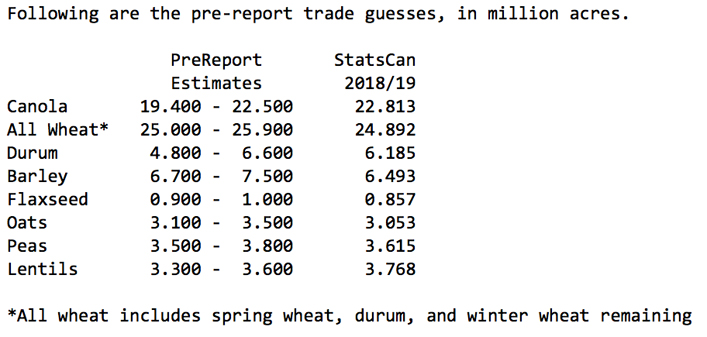Winnipeg – Canadian farmers will likely seed less canola and more spring wheat in 2019, but the extent of any acreage shifts remains to be seen as market participants await Statistics Canada’s first seeded area estimates of the year on April 24.
Canola prices in Western Canada have dropped over the past few months, as a trade dispute with China cuts into export demand. The uncertain trade situation has farmers questioning their planting intentions, but rotational issues will likely limit the exodus from canola.
“Farmers really aren’t sure what to do right now,” said broker Keith Ferley of RBC Dominion Securities. He described the dispute with China as “a cloud hanging over the market.”
Read Also

Farming Smarter receives financial boost from Alberta government for potato research
Farming Smarter near Lethbridge got a boost to its research equipment, thanks to the Alberta government’s increase in funding for research associations.
Average trade estimates call for a modest five per cent decline in canola area from the 22.8 million acres seeded in 2018, with a range from 19.4 million to 22.5 million acres.
“The China situation might scare a few people out of canola,” said Ken Ball of PI Financial, “but I don’t see any huge switches going on.” He said most farmers would likely stick with their rotations “and ignore the markets for now.”
Any area lost to canola will likely go into spring wheat, according to pre-report forecasts.
While spring wheat prices are also relatively low, improving yields and the ease of selling make it an attractive cropping option, said Jerry Klassen, manager of Canadian operations with Swiss-based GAP S.A. Grains and Products.
Pre-report estimates peg all-wheat area (including durum and winter wheat) at anywhere from 25.0 million to 25.9 million acres, which compares with the 24.9 million seeded in 2018. However, of that total, most estimates call for a downward revision in durum from last year’s 6.2 million acre crop.
Barley area is also expected to be up on the year, with pre-report estimates calling for an increase of five to 15 per cent from the 6.5 million acres seeded in 2018.


















